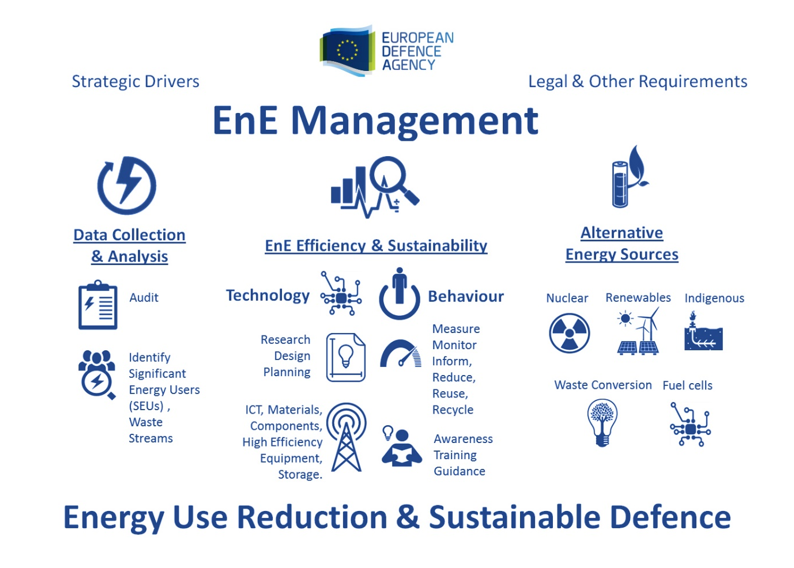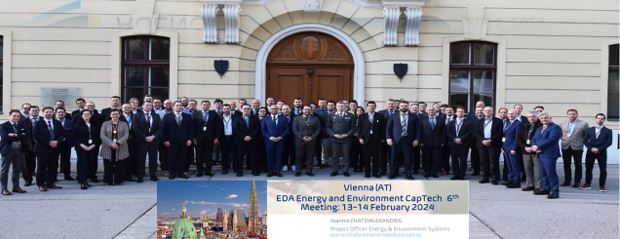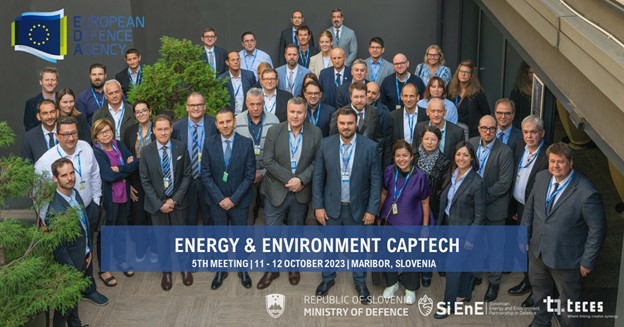SUMMARY
“… To this end, we will further develop full spectrum forces that are agile and mobile, interoperable, technologically advanced, energy efficient and resilient. In line with the single set of forces principle, these forces remain in the hands of the Member States and can also be deployed in other frameworks…
….Finally, we need to harness innovation to enhance the energy efficiency of the defence sector, including CSDP missions and operations, without reducing operational effectiveness. We will develop common benchmarks and standards for the increased use of renewable energy sources and the resilience of defence-related critical infrastructure. A special emphasis will be placed on innovation and standards that can help reduce the environmental footprint of armed forces and create possibilities to re-use valuable components and scarce materials.”
(A Strategic Compass for Security and Defence )
From ‘’Military Green’’ to the Energy and Environment CapTech
A common approach to energy and environmental challenges within the EU Armed Forces was created in 2014, following the ‘’Military Green’’ initiative, with the Energy and Environment WG. The EDA’s Steering Board, acknowledging the progress of the Energy and Environment Working Group, approved the transformation to a CapTech in 2021.
Over the last years, and especially with the introduction of the EU Green Deal, and its implementation on the defence sector with the ‘’Climate Change and Defence Roadmaps’’, the Energy and Environment CapTech served as a platform for Member States willing to deal in a collaborative way with energy and environment-related challenges in the defence sector. This process came along with activities and projects, that facilitated the main-streaming of energy topics within the EU MoDs; activities related to training (DEMC), smart camp demonstrators (SCTD), energy management methodologies (TEEMCAF), water and waste to energy management (Smart Blue Water Camps, WANTED), defence energy data collection efforts (EDCAS) and lastly focusing and exploring technologies (ARTENET), aiming at exploiting the opportunities that new technologies by developing collaborative sustainable energy projects in defence.
The EnE CapTech recognized the critical role that new technologies may play, and underpins all prioritisation tools (CDP, OSRA, KSA) with inputs related to energy covering both technology push and capability pull, linking the capability and technology areas by using an analytical layer of Technology Building Blocks (TBBs). In this context, the EnE CapTech has developed its Strategic Research Agenda (SRA) and identified TBBs for promoting energy solutions ranging from the energy storage and energy management technologies to wind and solar energy generation.
Mission of EnE CapTech
The EnE CapTech addresses energy, environmental and climate change related challenges and vulnerabilities by identifying technological gaps and proposing collaborative projects. In addition, it promotes the environmental perspective and provide capability-aware and strategically-informed advice on energy and environmental factors affecting the Armed Forces, delivering tangible benefits in accordance with pMS guidance and the Climate Change and Defence Roadmap.
SCOPE OF WORK
EnE CapTech’s Area of Responsibility
The CapTech EnE’s Area of Responsibility (AoR) focuses on R&T activities related to energy and environment systems, addressing strategic considerations concerning energy security and dependence on fossil fuels, resources security of supply, water security, energy efficiency, renewable energy sources, waste management and environmental change and protection. Three main strategic orientations of the CapTech EnE have been identified:
- Operational energy;
- Energy efficiency;
- Climate change and environmental impact of military activities.
The EnE Programme will include the following key themes, grouped under the above three main strategic orientations:
Operational energy: energy to foster military operations
- Renewable Energy Sources
- Defence Sustainability and Resilience
- Energy Management Systems including energy markets
Energy efficiency: Decreasing energy consumption and environmental footprint with direct or indirect benefit on military specifications such as autonomy, discretion, range of action
- Energy Efficiency
-
Energy Performance
-
Energy Security
Climate change and environmental impact of military activities
- Environmental Protection including biodiversity and health
-
Sustainable Procurement: Defence Industry Engagement, Supply Chain Security, and Life Cycle Assessment
-
Water Management
-
Waste Management
-
Environment Management Systems
-
Environmental Security
-
Climate action and decarbonization
-
Pollution (air, soil, water, noise)
-
Circular Economy
Additional key themes are also included:
-
Legislative implications such as the developments in energy and environmental policy and the opportunities and challenges for defence
-
Cultural Property Protection (CPP): Exploring measures for identifying and protecting cultural property during operations and in consistency with NATO doctrines and EU concept for environmental protection during NATO and EU operations respectively.

A total of 10 relevant technological R&T priorities have been identified and translated into Technology Building Blocks (TBB). The CapTechs TBBs, as they stand today, are the following:
- TBB01 - Alternative fuels and drive/propulsion systems
- TBB02 - Energy storage: electrical, electrochemical, mechanical, structural, and thermal
- TBB03 - Engine and power distribution system efficiency technologies
- TBB04 - Energy management technologies: innovative and efficient systems
- TBB05 - Solar energy generation (thermal and electrical generation)
- TBB06 - Militarization of environmental technologies: water and wastewater
- TBB07 - Energy harvesting/scavenging
- TBB08 - Wind energy
- TBB09 - Energy and environmental technology systems integration
- TBB10 - Militarization of environmental technologies: energy from waste (or waste to energy) technologies
Requests for membership to Captech Energy can be submitted to the CapTech moderator. Be aware that your request will be forwarded to your national authorities. The approval of the CNC will be needed to become a Governmental Expert (CGE) or non-Governmental Expert (CnGE), and for your participation in an CapTech Energy event. To become a member of the CapTech (CGE or CnGE), please contact us at: [email protected] or [email protected]
EnE CapTech’s Recent Activities
The 6th Energy and Environment (EnE) CapTech Meeting

More than 80 industry experts from 15 individual Ministries of Defence (MoD) joined the 6th Energy and Environment (EnE) Captech Meeting.
The 6th Energy and Environment CAPTECH meeting, convened on February 13th and 14th, 2024, in Vienna, Austria, witnessed the convergence of representatives from industrial sectors and defence ministries from over 20 European countries. With more than 80 industry experts joining delegates from 15 individual Ministries of Defence (MoD), the event, hosted by the Austrian National Defence Academy in Vienna, provided a critical platform for aligning the defence needs of the European Union, the European Defence Agency, and individual Ministries of Defence with innovative technological solutions developed by the civil sector. Central to the discussions was the imperative of synchronizing defence requirements with technological advancements, emphasizing the pivotal role of civilian representatives in providing innovative solutions.
The 5th Energy and Environment (EnE) CapTech Meeting

More than 55 experts from 16 European countries and different institutions and organisations participated in the 5th Energy and Environment (EnE) Captech Meeting.
EDA organised the 5th EnE CapTech meeting on 11 and 12 Oct 23 hosted by the Ministry of Defence of Slovenia, TECES and the Slovenian Energy and Environment Partnership in Defence (SiENE), for the first time in a physical format since the EnE Captech formation by Jan 2020.
The two-day EnE CapTech meeting took successfully place at Maribor (SI) within a very challenging geopolitical moment, with energy prices skyrocketing and many countries reconsidering their energy supplies and routes as a result of the Russian war in Ukraine and the terrorist outbreak at Middle-East. At this meeting the CapTech participants had the opportunity to meet for the first time and have an interesting exchange in view of implementing the Captech Strategic Research Agenda (SRA).
The ‘’Industry Rapporteur’’ was presented to the CapTech community, and MoDs representatives, Industry and Academia members were updated as of their expected role and expectations within the Captech environment and activities.
During the event, technical solutions within the spectrum of interest for the EnE CapTech were presented. Special attention was given to the processes for initiating EDA collaborative projects (Cat A and Cat B) and particularly on the existing Cat B project of the EnE CapTech: E+ZERO, the first-ever one for the EnE Captech.
The E+ZERO project concerns the development of energy plus and zero emissions rapidly deployable temporary buildings for smart energy-independent and energy-efficient deployable camps.
Next EnE Captech meeting: The 6th EnE CapTech meeting is scheduled to take place in Vienna (AT), hosted by the AT MoD at the AT National Defence Academy on 13 and 14 Feb 24.